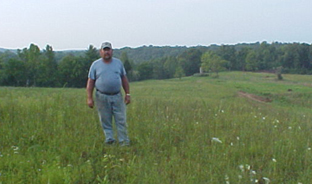News Release |
|
Media Contact: Fred Strohl Communications and Media Relations 865.574.4165 |
Innovative projects help ORNL win 3rd straight DOE Pollution Prevention award
| Audio Clip |

| |
Fred Nelson fertilizes his hayfield in Rockwood processed sheetrock scraps from ORNL construction. The project by ORNL, contruction contractor Heery International, and the UT Center for Industrial Services and Waste Connections averted waste disposal costs for about 80 tons of waste wallboard.
(hi-res image) | |
ORNL Director Jeff Wadsworth said 75 ORNL staff members in five directorates and seven divisions contributed to winning the award, which recognizes lab strategies to reduce legacy waste material hazards.
"Our pollution prevention philosophy is quite broad based," Wadsworth said. "The cost savings and the recognition by DOE reflect the success of our programs."
One of the more innovative initiatives was donation of an accelerator from ORNL's former Surface Modification and Characterization research center to Alabama A&M University. The donation was part of a lab effort to recycle or reuse 150 tons of potentially hazardous materials, save landfill space, an avoid disposal costs. "The university paid for the disassembly and transportation of the accelerator, and that meant we did not have to pay for processing and disposal," Wadsworth said. "Not only did they get a good piece of equipment, but the laboratory saved more than $2.5 million and eliminated waste, and the equipment found reuse."
In another project, ORNL worked with the University of Tennessee's Center for Industrial Services and Waste Connections to convert 80 tons of gypsum wallboard scraps from construction of the laboratory's Multipurpose Research Facility into fertilizer. The recycled wallboard fertilizer is being distributed to area farmers.
Other ORNL initiatives recognized by DOE and contributing to the award were the implementation of conceptual landscape design guidelines, instituting a green transportation program to reduce petroleum consumption and a successful effort to cut wastewater and sludge generation. The award further recognized ORNL's efforts to ensure continued positive impacts in environmental management, safety and effectiveness.
ORNL is managed by UT-Battelle for the Department of Energy.


